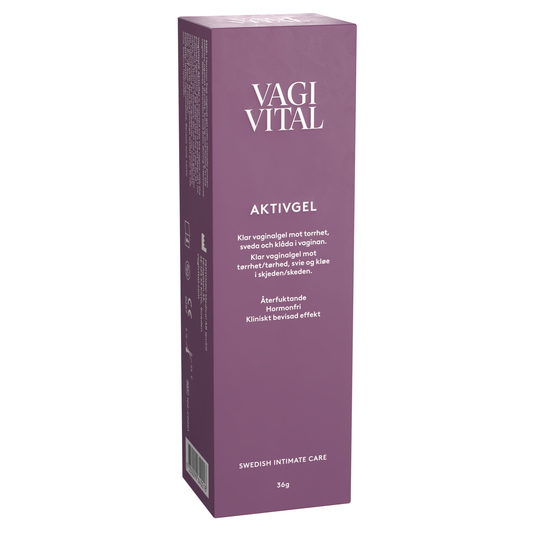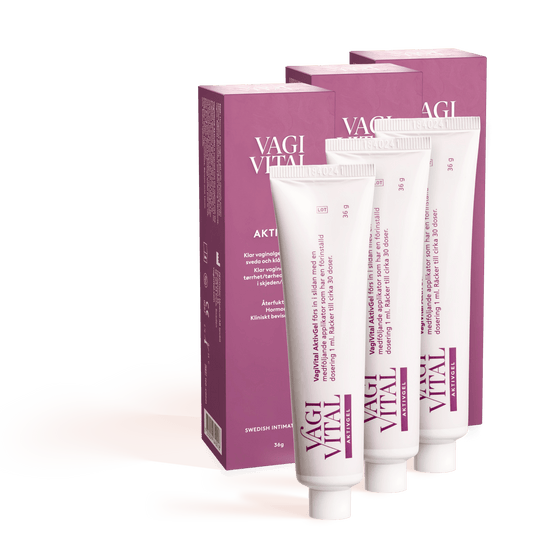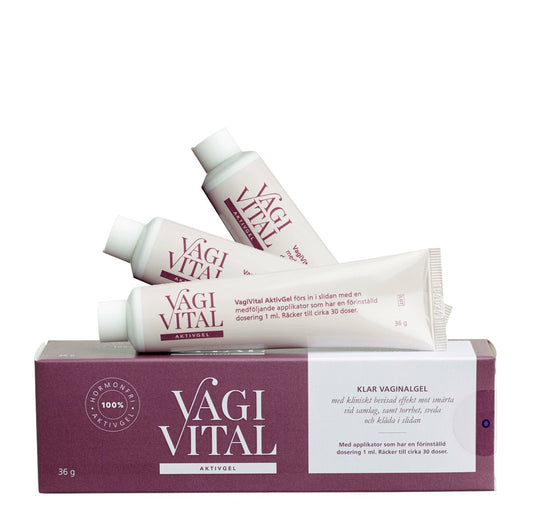10 myths about ovulation and what the research says
Easter is a time filled with eggs – but let’s talk about another kind of eggs: those in your ovaries. Whether you are still ovulating or that time is behind you, the ovaries play a big role in your health. They affect everything from mood and metabolism to bone health and brain function.
Here we reveal what current research says and debunk 10 common myths about ovulation. Can you get pregnant more days than you think? Do you really have no eggs left after menopause? And does ovulation affect your health – even after your last period? Read on and get answers to common misconceptions ❤️
MYTH 1: AFTER MENOPAUSE THERE ARE NO EGGS LEFT
❌ Partly true! After menopause, there are often some egg follicles left in the ovaries, but these are no longer fertile. When the number of eggs drops below 1,000, ovulation stops completely (Läkartidningen, 2023).
However, the ovaries continue to produce small amounts of hormones that contribute to heart, bone, and brain health throughout life
👉 Conclusion: Even after the last period, the ovaries are important for health.
MYTH 2: YOU ALWAYS FEEL INCREASED DESIRE DURING OVULATION
❌ False! It is true that many women experience increased sexual desire around ovulation, as hormone production is at its highest then. But according to research from the Journal of Sex Research (2022), only about 30 percent of women notice a significant increase in desire.
If you don’t feel any increased desire and perhaps also experience dryness, you are far from alone. Try VagiVital Active Glide – a moisturizing, water-based lubricant that makes sex more comfortable with dry mucous membranes 🙌
👉 Conclusion: Increased desire around ovulation is common, but far from experienced by all women.
Buy Active Glide lubricant here
MYTH 3: EARLY PERIOD MEANS EGGS RUN OUT FASTER
❌ False! All women are born with 1–2 million egg follicles. About 1,000 follicles are used up each month, but only one egg reaches full maturity. When you get your first period does not affect how quickly the eggs run out – this is instead determined by genetic factors and lifestyle (World Health Organization, 2021).
👉 Conclusion: Early onset of menstruation does not affect your egg reserve.
MYTH 4: HAVING MANY CHILDREN MEANS YOU HAVE MORE EGGS LEFT
❌ False! During pregnancy and breastfeeding, ovulation is indeed paused and eggs are temporarily saved. But overall, the number of eggs is genetically predetermined and is not affected long-term by the number of pregnancies (Karolinska Institutet, 2022).
👉 Conclusion: The number of children does not affect how many eggs you have left in the end.
MYTH 5: OVULATION ONLY AFFECTS FERTILITY
❌ False! Ovulation affects the whole body through hormone balance:
- Bone health: Estrogen protects against osteoporosis.
- Metabolism and blood sugar: Ovarian hormones affect metabolism.
- Mood and mental well-being: Estrogen can raise serotonin levels and reduce the risk of depression (The North American Menopause Society, 2023).
💡 Did you know? After ovulation, estrogen drops sharply, which can cause dry and sensitive mucous membranes. If you experience this, try VagiVital AktivGel, a hormone-free crystal-clear gel that treats dry mucous membranes and is studied at Swedish university hospitals.
👉 Conclusion: Ovulation is about much more than fertility.
Buy AktivGel for dry mucous membranes here
MYTH 6: YOU CAN ONLY GET PREGNANT ON OVULATION DAY
❌ False! Sperm can survive up to five days in the female body. Pregnancy can therefore occur several days before ovulation itself. The fertile window is about six days long (American Society for Reproductive Medicine, 2023).
👉 Conclusion: It is possible to get pregnant several days before ovulation.
MYTH 7: OVULATION ALWAYS HAPPENS ON DAY 14
❌ False! The menstrual cycle varies between 21–35 days, and ovulation can occur between day 10 and 20. Stress, weight changes, or illness can also affect the timing (National Institutes of Health, U.S. public health institute, 2022).
👉 Conclusion: The day 14 rule is far from universal.
MYTH 8: ALL WOMEN HAVE A LOT OF DISCHARGE DURING OVULATION
❌ False! About 40 percent of women notice clear changes in discharge during ovulation. Many women, however, have sparse discharge and experience dryness, which is completely normal (Fertility and Sterility, 2023).
💡 Tip: If you feel dry, try our Stay Pussytive Kit – a package with four of our most popular products that effectively treat and moisturize dry mucous membranes.
👉 Conclusion: Not all women experience abundant discharge during ovulation.
Buy our moisturizing Stay Pussytive Kit with 10% discount here
MYTH 9: ALL WOMEN CAN FEEL WHEN THEY ARE OVULATING
❌ False! Only about 20 percent feel physical signs such as dull pain or clearer changes in discharge in connection with ovulation (British Medical Journal, 2021).
👉 Conclusion: You don’t need to feel symptoms to be ovulating.
MYTH 10: MISSING OVULATION MEANS YOU ARE INFERTILE
❌ Not entirely true! Skipping ovulation sometimes is normal. Regularly missing ovulation can be due to stress, weight changes, or hormonal imbalance and should be examined by a doctor if you are trying to conceive (National Institutes of Health, U.S. public health institute, 2022).
👉 Conclusion: Occasional missed ovulation does not mean infertility.
YOUR BODY – IMPORTANT LONG AFTER THE LAST OVULATION
Whether you are ovulating or that time is behind you, your ovaries and hormones continue to affect your health, your mood, and your quality of life. By understanding your body better, you can give yourself the best conditions to feel good – for life 🙌
Take care & Stay Pussytive ❤️
/Fanny Falkman Grinndal
Business Manager Nordics
Peptonic Medical AB
fanny.falkman-grinndal@peptonicmedical.se
Recommended products for you
- Choosing a selection results in a full page refresh.
- Opens in a new window.













